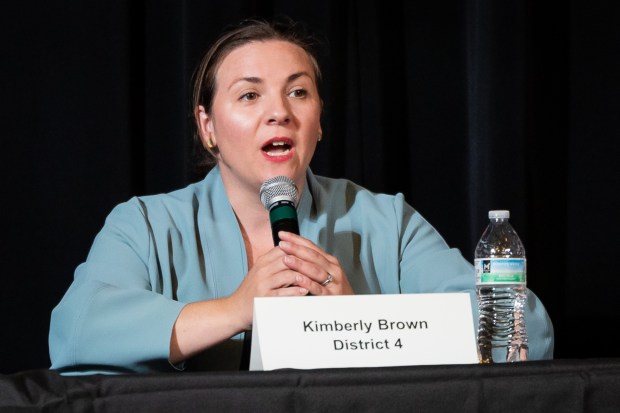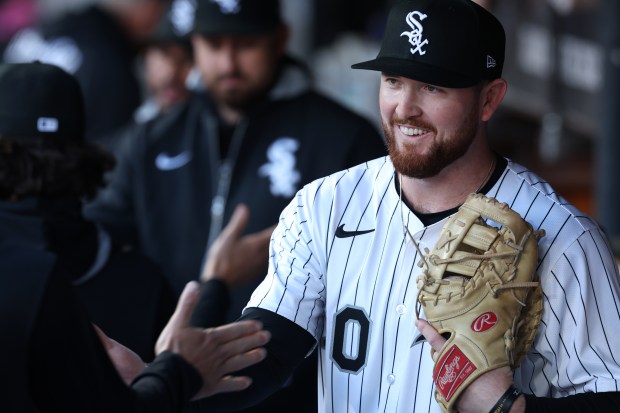District 4 is located on the North Side of Chicago, primarily covering the Lincoln Park, Lakeview, Uptown and North Center neighborhoods, but also portions of Old Town, Bucktown and Edgewater.
Here’s what to know about the race in the 4th District. For a look at how the elected school board will work and more on the races in the other districts, click here.
Who’s running?
There are six candidates running in the 4th District: Kimberly Brown, Karen Zaccor, Ellen Rosenfeld, Thomas Day, Andrew A. Davis and Carmen Gioiosa.
How much money has been raised?
In the 4th District, roughly $370,000 has been raised among the six candidates through Oct. 21.
Of these candidates, Rosenfeld has the most cash, raking in about $172,000, followed by Zaccor, who has amassed approximately $125,000. For his part, Davis has collected around $25,000, while Brown has raised just shy of $23,000. Tailing them are Day and Gioiosa, stacking up roughly $16,000 and $9,000, respectively.
What are the candidates’ campaign platforms?
Kimberly Brown
What is your background in education?
I’m an adult educator with 6+ years of teaching experience in the classroom and executive learning & development. I’m currently an adjunct professor at Roosevelt University, Lake Forest Graduate School and restarting at Loyola University Chicago in January. I’m also an executive educator at Lake Forest Center for Leadership.
Why are you running for a seat on the Chicago Board of Education?
I am the only candidate with proven, successful experience running an organization as large as CPS as well as being a CPS parent and educator.
I’m a champion for Chicago’s future, driven by a deep commitment to education, community and resilience.
Born into a working-class family with a deep-rooted connection to Chicago and a family legacy in public service, my early experiences instilled in me the importance of hard work and the power of education to transform lives.
I believe that we can grow our economy and create a brighter future for all by investing in our schools and communities. I am a strong advocate for small business support, community empowerment and equitable access to education. My commitment is to create opportunities and foster growth in Chicago.
I have held executive positions in highly regulated industries, including government, education and financial services. My experience as a diverse learner, CPS parent and educator has given me firsthand insight into the needs of students and families.
With my strong leadership skills and unwavering commitment to Chicago, I am a powerful force for positive change.
How would you describe your campaign platform?
We are truly independent — no mayoral, CTU or political backing. We are CPS-parent volunteer run and supported. We believe strong public schools create strong and vibrant economies. We believe the CPS Board needs experienced leadership with a fresh, outside perspective.
What is the single most important issue facing CPS students?
Priority #1 is getting the buses back and supporting district-managed, group transportation for all CPS students.
I am the only candidate in District 4 that is endorsed by CPS Parents for Buses because I am in alignment with their group and earned the parents’ trust to be the leader to make change quickly.
We need to bring back buses immediately. Driver shortage is an excuse, and we need to work with our amazing Chicago community to rethink and reactivate safe, district-managed transportation to school for every student. This means a database and map of every student and where they go to school to match them to available transportation options including walking groups, bike buses, car pools and bus stops managed by safe passage adults. This is not a budget or a resource issue. This is a lack of innovative thinking and prioritization. We need to get children to school safely via district transportation, and we can do that with and without traditional yellow school buses.
We need a district-wide approach that is required for every school and includes school- and community-specific committees to tailor to their unique situation. This includes leveraging the results from the Chicago School Zone improvement study with multiple safety upgrades to neighborhood streets with crossing upgrades, enhanced signage, traffic calming, reduced speed limits, and truck restrictions. Infrastructure improvements include curb bump-outs, raised crosswalks, and refuge islands. We cannot do a piece-by-piece roll out. We need a comprehensive plan with a timeline that is activated across the district.
My view of transportation policy is based on lived experiences as a child, adult, parent, and organizational leader. We are a public transportation, bike and walking family. I’ve been a Chicago pedestrian/bike and CTA commuter for my adult life out of necessity. My personal and family experience deeply shapes my view of transportation for school. When I was growing up, my parents intentionally got a home near the schools, so my siblings and I could walk while our parents were working. As a young adult, I had virtually no money and depended on public transportation or affordable housing near my work for my livelihood.
If our children can’t get to school safely and reliably, nothing else matters. This is important for children who have caregivers they can’t rely on as well as caregivers who can’t be late for work.
As an organizational leader, part of my experience is finding patterns and efficiencies with subject matter experts to get to the desired outcome. It’s inexcusable that CPS does not have a district-managed and comprehensive school transportation system.
If our children can’t get to school safely and reliably, nothing else matters.
Provide three to four key points you want voters to know about your campaign.
My top campaign priorities are:
- Bring Back Buses — If you can’t get to school, nothing else matters. Every student needs safe transportation. Whether it is a bus, bike bus, or walking group. Let’s build a CPS-wide community culture and have it start with getting to school. I am proudly endorsed by CPS Parents for Buses.
- Improved Procurement — CPS spends 1.2-1.5 more than retail pricing too often. Improved financial management across people, process and technology is critical to make every dollar work harder and is the fiduciary mandate to taxpayers.
- Access & Transparency — We will begin the culture change with CPS HQ to match our CPS families. Mobile-friendly, multi-language, easy-to-search websites across departments and schools. School and District visualizations that are easy to read, updated bi-annually, and based on performance and feedback. Children with disabilities will not require lawyers to be treated fairly. Principals will stay at schools for 10+ years and be top performers across every metric.
To read this candidate’s questionnaire in its entirety, click here.
Karen Zaccor
What is your background in education?
I’m a former CPS teacher who just retired in June. I became a teacher in 1996 and am a co-founder of Uplift Community High School. As a teacher, I worked to make my curriculum challenging, engaging, and culturally relevant, giving my students an opportunity to have a voice in their learning and to engage in projects that lead to impactful change. I am also part of the Anti-Racist Educators Committee of Sustainable Community Schools, working on curriculum.
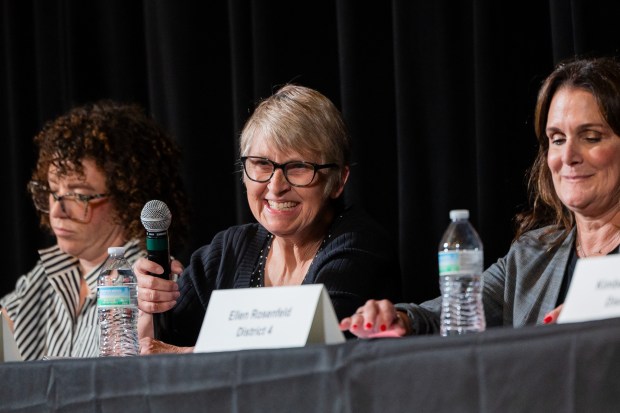
Why are you running for a seat on the Chicago Board of Education?
In our fight for the elected representative school board, we envisioned a board that would be about the humanity of our students–students as whole people, not just vessels to receive instruction–and would prioritize the needs and interests of our Black and Brown communities that have been disinvested in for decades. We envisioned a board that would not favor corporate interests and privatization, but would be about developing schools throughout the city to be hubs in their communities focused on serving the whole community and developing the whole child. We envisioned a board that would be made up of parents and educators and education activists dedicated to being accessible to the community and truly listening to their needs and interests. I am running to realize that vision.
How would you describe your campaign platform?
My campaign platform is a progressive, equity-driven, community-centered platform formed from decades of experience working in CPS. It focuses on the need to expand and implement the Sustainable Community Schools model, and holistically treating our students as complete human beings.
My primary issues are:
- Full and equitable resourcing and support of schools, beginning with the schools with the highest need.
- Development and expansion of Sustainable Community Schools as our best model of equity.
- Safe, clean, green, healthy, joyful schools, in which students feel valued and supported by an environment that promotes learning.
What is the single most important issue facing CPS students?
Equitable school funding. For decades, CPS has not equitably resourced schools, as facts demonstrate. The result is that we have some of the finest schools in the country while other schools have been disinvested and staff exhorted to “do more with less.” Unfortunately, all too often disinvested schools are in disinvested communities and student basic needs are not being met, which are a prerequisite to being ready to learn. So there is a failure of both CPS and city policy to ensure all students are provided with what they need in order to be successful. We can’t be satisfied with excellence for a few. Our job is to improve student outcomes and that means all students.
This inequity must be rectified, and it will be our job as members of the school board to take the lead. Our first step should be to actually follow the state policy and practice of ensuring funding goes where the need is greatest, and direct future additions to funding neighborhood schools that have been under-resourced. We must also recognize that giving neighborhood schools the funds now that they should have always had will not repair the decades of damage that depriving them of resources has done. Extra supports will be needed.
Provide three to four key points you want voters to know about your campaign.
My campaign is powered by grassroots efforts. I have been active in education equity work and other community issues for decades, and this is a continuation of that work. My core beliefs about education come from this extensive work in my own community and with parent-led community organizations from around the city. I am the only candidate in this district who has been a teacher in CPS in the last 15 years. During that time, education has changed dramatically. Common Core and Next Generation Science Standards have changed how we think about teaching and learning. We have revised discipline policies based on a deeper understanding of the need for restorative culture. Technology advancements have brought both assistance and challenges to our classrooms, both of which require action. And of course, the pandemic brought to light the mental health needs of our students. I have experience that no other candidate has with all of these and more.
To read this candidate’s questionnaire in its entirety, click here.
Ellen Rosenfeld
What is your background in education?
I taught 3rd grade at Hartigan and Dulles Elementary Schools and served as a parent representative and chairwoman on the Local School Council, as well as on the Local School Council Advisory Board. Currently, I work as a Family and Community Engagement Specialist at CPS and help run a Parent University. With almost 30 years in the field, I have witnessed both successes and challenges within CPS, advocating for high-quality education for all children, regardless of their backgrounds.
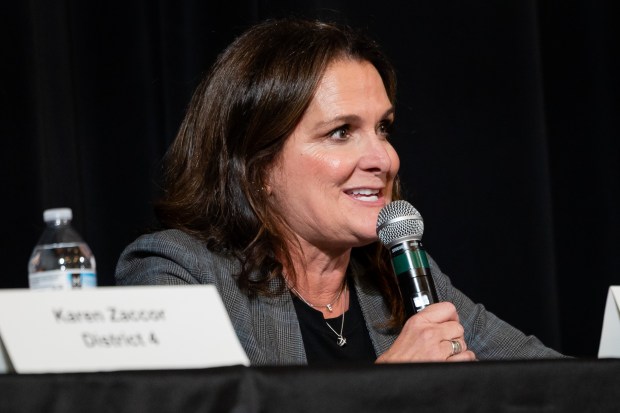
Why are you running for a seat on the Chicago Board of Education?
I have been an involved parent for all four of my children, all of whom attended CPS K-12 schools. As an education professional, I taught 3rd grade at Hartigan and Dulles Elementary Schools, served as a Local School Council parent representative and chairwoman, and served on the Local School Council Advisory Board. My dedication to education goes even further—I currently work as a Family and Community Engagement Specialist at CPS and help run a Parent University. My personal connection to CPS, as a parent, a teacher and a community member, gives me a unique understanding of the system. I have seen where CPS has been successful and where they face challenges. I stand firm in my belief that every child regardless of income, race, religion, or circumstances, deserves a safe, rigorous, high-quality education. I have witnessed children and families thrive at CPS, while others struggle. My diverse experiences have provided me with a deep understanding of the complexities and opportunities within the education system, particularly in Chicago Public Schools. Serving on the Board of Education would be the perfect way to marry the knowledge I have earned with my sincere desire to improve student outcomes across Chicago schools. It would provide me with the opportunity to use my experiences and insights to make a broader impact on education policy and practices for all of our students.
How would you describe your campaign platform?
As a long-time CPS parent, former teacher and family and community engagement specialist, my campaign is all about putting students first and making sure our schools are places where every child can thrive. I believe in educational equity, meaning every student, regardless of where they live or their background, deserves access to high-quality education, well-funded schools and the resources they need to succeed. I am committed to long-term solutions that focus on supporting students, improving the district’s finances and empowering families and communities to have a real voice in the future of CPS. I’m also a strong advocate for ensuring that our teachers and staff have the tools, training and support to do their jobs effectively and that schools offer more comprehensive services to meet the diverse needs of our students. Transparency, accountability and collaboration are key pillars of my platform —I will work to make sure the community has a real say in decisions that affect our children’s education. At the end of the day, my goal is to bring a fresh, independent perspective to the school board and make CPS a place where all students have the opportunity to succeed.
What is the single most important issue facing CPS students?
The most important issue facing CPS students is educational equity. While there has been some progress, significant disparities remain in the quality of education students receive depending on where they live, their family’s income, and factors like language barriers or special needs. We need to ensure that all CPS students, regardless of their background, have access to high-quality teachers, well-funded schools, comprehensive support services, and enrichment opportunities.
Provide three to four key points you want voters to know about your campaign.
- Keeping Students Safe – I fully support implementing and funding CPS’s new school safety plan because safety is about more than physical security. To improve safety and create a positive learning environment, we need to prioritize mental health resources, expand restorative justice programs, and ensure staff are trained in conflict resolution. Strong, trusting relationships between students, teachers, and families are essential. I envision schools where students feel a deep sense of belonging, diversity is celebrated, and everyone can express themselves in a safe space. By fostering respect, we create safer schools and thriving communities.
- Improving Student Experiences – I support innovative solutions, like forming strategic partnerships with major corporations based in Chicago. Imagine the impact of companies like Google, Microsoft, and over 30 other Fortune 500 companies joining forces with CPS. They could provide not only financial support but also valuable resources and real-world opportunities for students. I’ve seen this work when Lettuce Entertain You partnered with my 3rd-grade class at Hartigan Elementary, sponsoring holiday gifts, a downtown trip, and a special lunch. Partnerships like these could bridge funding gaps and enrich education, building a brighter future for Chicago students.
- Authentic Community Engagement – When considering new policies or major decisions, I will actively seek input from a diverse group of stakeholders. This includes deliberately reaching out to Local School Council members, who, in my experience, are often strong advocates for their communities. Authentic community engagement means building meaningful, ongoing partnerships between schools and the communities they serve, ensuring that all voices are heard and valued. I am committed to maintaining transparency and providing opportunities for community members to shape decisions that directly affect them. True engagement is not a one-time consultation but rather an ongoing process built on trust.
To read this candidate’s questionnaire in its entirety, click here.
Thomas Day
What is your background in education?
I have served as a substitute teacher at Tubman Elementary in Lakeview during the previous and current academic year.
Why are you running for a seat on the Chicago Board of Education?
In my judgement, what CPS confronts right now is one of the most profound and consequential crises our city has ever faced. If we’re going to find our way out of this mess, we need public servants committed to good governance.
As I write this, Mayor Johnson has just appointed allies to the CPS Board who will soon fire CEO Pedro Martinez and force CPS to take out a massive payday loan, all in service of the hysterical demands of Stacy Davis Gates. CPS is already managing a $505 million deficit; Brandon Johnson’s actions could blow the roof off of our fiscal challenges. Consider also that CPS must urgently pay for $3 billion in capital repairs. And CPS is paying about $800 million each year in servicing debt. This is what happens when power seekers and special interests attain unchecked power.
Something happened last March that drew me into this race. In front of City Hall, an ally of Mayor Johnson led a rally where an American flag was set on fire. Months later, Mayor Johnson appointed a woman who has called for the total abolition of the Chicago Police to closely advise his administration. Clearly this is no political environment where reform is possible. We must turn down the temperature on our politics and refocus on results.
My motivations are personal. I am a new CPS parent. My son is a kindergartner at Hawthorne Elementary. I am running because I simply could not stand by as extremists drive our public school system in a financial catastrophe.
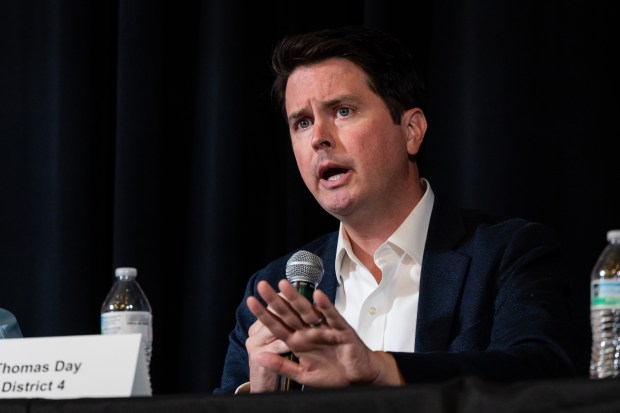
How would you describe your campaign platform?
Fiscal responsibility, driven by courage and a sharp focus on policy solutions, not rhetoric. For the past decade, after the Illinois Supreme Court struck down pension reform and with the backlash to the 2013 CPS school closures, a culture of fiscal lunacy has reigned in Chicago. I believe, with the chaos we’ve witnessed in the past few weeks, a new era in Chicago politics has begun, one centered on good governance, balanced budgets, reason, and civility — and I’m here to help lead that movement.
I am a mainstream Democrat who is comfortable questioning some of the extremism and echo-chamber politics of my own party. Yes, we need to make some tough choices to balance our budget. We need to expand enrollment at schools that work and shutter those that aren’t. We need to build and act on a long-term vision for Chicago Public Schools that provides modern, integrated, and fully enrolled schools where kids can succeed.
I have consistently demonstrated the courage to stand up for good governance before politics, grabbing the “third rails” of Chicago politics with both hands. That’s why Alderman Scott Waguespack endorsed me. He and I are committed to confronting the extraordinary confluence of challenges Chicago faces with bold, fearless action.
What is the single most important issue facing CPS students?
Last academic year, only a quarter of students tested at grade level in reading and 17 percent tested at grade level in math. For Chicago, this is five-alarm emergency. We cannot expect to be a competitive global city when so few of our kids are prepared to enter the extraordinary and challenging job markets of tomorrow.
We need to recognize the COVID-19 lockdowns went on way too long and caused immense learning losses and social and emotional damage to our kids. Then we need to invest in tutoring programs to get our students back on track. As representative of the 4th District, I’ll fight to fund tutoring programs for CPS kids that remain behind the pace – and there are lots of them.
We also need to address the problem of chronic absenteeism. 40 percent of students were chronically absent last academic year. I believe we need to intervene early when a student is not showing up for school. That process can be aided by a focused and data-driven effort on understanding why kids aren’t showing up to school.
But the kids aren’t the only ones who were chronically absent last year at unacceptable rates; 43 percent of teachers last year were also chronically absent. I believe our teachers are the very best this city has to offer. I have been blessed to call a few friends and colleagues as I’ve subbed at Tubman Elementary the past year. So, I say with great respect: We can’t have another year where the teachers themselves are 43 percent chronically absent. I will fight for more mental health support for our teachers, but we need to understand why so many were chronically absent last academic year and make certain that doesn’t happen again.
Provide three to four key points you want voters to know about your campaign.
The record of CPS should enrage all Chicagoans. Hundreds of millions of dollars in wasted spending. Empty schools. Horrific test scores. A $505 million deficit. CPS is spending about $800 million annually servicing long-term debt — dollars that could have been spent for far, far more productive purposes. I am ready to take on extraordinary confluence of challenges that CPS confronts. First, we cannot continue to fund empty schools. CPS continues to support 12 high schools that are more than 80 percent empty. These 12 schools are deeply segregated; of the 12 most disenrolled high schools, only one school last year served a white student. Test scores at these 12 high schools are horrific. One percent of students at these 12 schools tested at grade level in math, according to public data. And though spending per pupil at the 12 most disenrolled high schools is nearly twice that of the entire district, Mayor Johnson and Stacy Davis Gates want to double down on these schools — not out of commitment to student achievement, but to preserve their own power. This is not my idea of progressive. Second, we cannot continue to raise property tax levies to the maximum allowed by state law. If the CPS budget had simply kept pace with inflation over the past ten years, it would be more than $1 billion smaller than it is. What have we received for this extraordinary increase in expenditures? Very little, test scores would suggest. I am committed to bending the property tax curve through school consolidation and lending my voice to a renewed effort to provide Illinois voters a chance to vote on a constitutional amendment to reform public sector pensions. Third, we need new school buildings. The average age of a CPS main building is 84 years old. CPS schools and facilities have $3 billion in urgent capital repairs. We need a long-term capital plan to build modern, integrated, and fully enrolled schools. To address these urgent concerns, I have put two proposals at the center of my campaign. I have proposed the CPS Board empanel something I call the “Chicago Public Schools Advancement and Modernization Commission,” staffed by CPS families, teachers, real estate experts, business scholars, and community leaders. This commission is modeled after the federal government’s Base Realignment and Closure (BRAC) process. Under my plan, the Chicago Public Schools Advancement and Modernization Commission would present to the CPS Board a list of facilities to close or consolidate. The CPS Board would review the list, provide some iterative feedback, but ultimately take an up-or-down vote; a vote to disapprove the commission’s recommendations will trigger a process to close all schools that are 70 percent or more underutilized over a four- to eight-year period (clearly not ideal, but better than the status quo). Before the Chicago Public Schools Advancement and Modernization Commission would report to the CPS Board, they would need to meet two critical requirements: First, the commission must set a plan for what to do with that school building before a closure is completed. Second, the commission must present a plan to assign students to new schools that will, to greatest extent possible, maximize racial integration. I also propose that we build 20 new CPS schools that consolidate 60 disenrolled schools. To finance such an effort, I believe a $1 billion bond would be required — which is, of course, an insane idea unless we first deal with the long-term drivers of our structural budget deficit. Consolidating disenrolled schools will help calm the bond markets, but I recognize that we need to go further. That’s why I think it’s so critical that state lawmakers revisit pension reform. What I have just proposed is a parallel process where we deal with the long-term drivers of our deficit and, at the same time, take on additional short-term debt. I recognize this is not without risk, but I think it’s clear we will soon be entering a lower interest rate environment. So let’s take advantage of it.
To read this candidate’s questionnaire in its entirety, click here.
Andrew A. Davis
What is your background in education?
I was the Executive Director of The Illinois Student Assistance Commission for five years and led the six billion dollar balance sheet entity safely through the great recession. I then moved to the private sector and lead a start up Income Sharing funding company. Now I am the President of The Education Equity Fund, NFP which I founded five years ago. We help Chicago teachers pay for Principal training at UIC’s EdD program. My experience in education governance involves seventeen years on the Board of Trustees of Beloit College, the last five as Board Chair. I served on the LSC of the Newberry School.
Why are you running for a seat on the Chicago Board of Education?
I am a life long Chicagoan and believe that the future of the city is dependent on turning around a system that currently fails two out of three students.
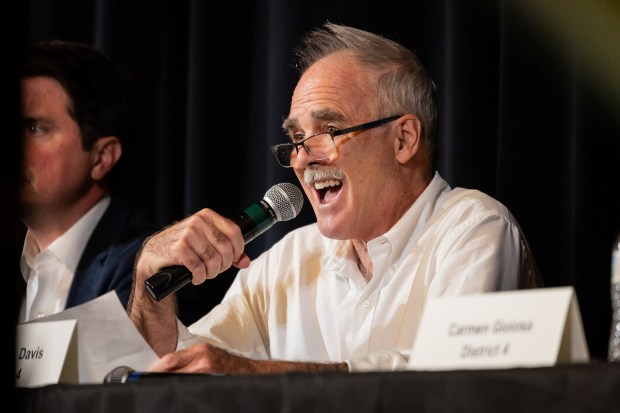
How would you describe your campaign platform?
I propose that the Board charge CPS staff with dramatically increasing student achievement while also acting as prudent stewards of the taxpayer’s money.
What is the single most important issue facing CPS students?
Two out of three third-graders are not reading at grade level. This can lead to nothing good.
Provide three to four key points you want voters to know about your campaign.
My focus is on student achievement, parent choice, budget transparency and financial solvency.
To read this candidate’s questionnaire in its entirety, click here.
Carmen Gioiosa
What is your background in education?
My 23-year background in education is extensive and varied. My experience will have a direct impact on effectively leading conversations, building consensus, and analyzing policy. I have a Doctorate in Education Organization Leadership from the University of Illinois at Urbana-Champaign, with a Type 75 administrative certificate. I am an adjunct professor educating future CPS teachers through a culturally responsive framework through National Louis University’s Teacher Residency Program. I started my CPS career at Schurz High School as a teacher for 8 years, and led a team to earn a $1.25M grant to reorganize our high school into Small Learning Communities (a Freshmen Academy and 4 career-focused academies for upperclassmen). I then worked at CPS Central Office, bringing an MTSS resolution before the Board of Education, with the accompanying academic and social-emotional interventions for students identified in need. After serving on the board of my local neighborhood association, I served as a community member to our neighborhood Local School Council prior to having children in CPS. I have subsequently been elected to our LSC 4 times as a parent representative, and have been nominated 3 years in a row as LSC Chair.
I actively and directly participate with CPS daily. In addition to teaching future CPS teachers, I am in CPS classrooms observing lessons and coaching teachers throughout Chicago. My husband is a CPS alum, our two children attend a CPS neighborhood elementary school, I’ve served as a PTA room parent, PTA officer, support fundraising events, and take every opportunity to support and improve our school. Families, community members, teachers, and administrators all work together to make my childrens’ school a well-rounded and successful place to learn. I want all schools in District 4 and in Chicago to have the same wonderful, enriching experiences and traditions we have at our local school.
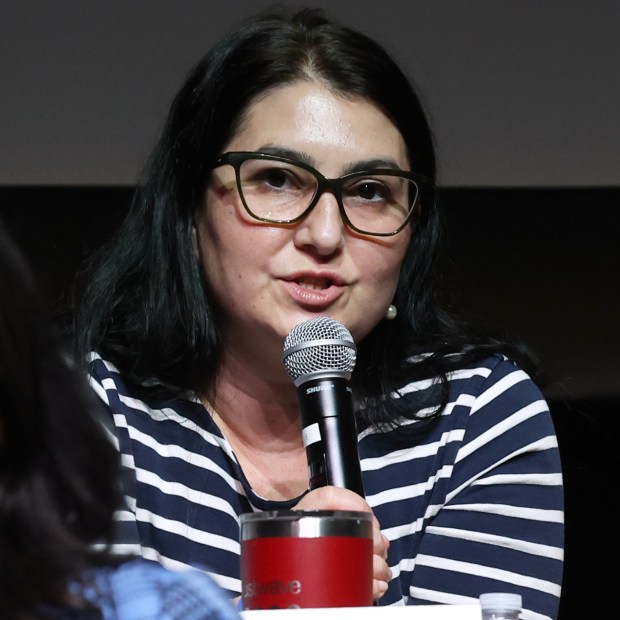
Why are you running for a seat on the Chicago Board of Education?
I have the immense privilege of knowing nurses, teachers, lawyers, police officers, carpenters, and business owners who live and work in our great city, who once sat in my classroom. My students grew up and are now taking care of my family and your family. This is what education is about; it is about creating community. That is why I am running for the Chicago Board of Education.
The potential in our young people is infinite, and education is the key to that potential! At this time in Chicago, leadership must be transformative. Three common elements that are central to transformative leadership are social betterment, equity, and a vision that reshapes belief and knowledge structures (Shields, 2010). Chicago’s Elected School Board has an opportunity to be transformative and inject CPS with fresh ideas from independent voices.
I have both the background and proven record of challenging the status quo for the benefit of real improvement. My focus has always been on ensuring students receive the best education possible. I am well suited for this position as an independent, data-driven, experienced education professional.
Here are some key policy proposals, developed through my CPS experience and doctoral research:
1) Increase preschool enrollment and attendance: Children may miss critical language, numeracy, and social emotional skill development by delaying entry to school until the age of 6.
2) Laser focus on two core benchmarks. First: Ensuring reading proficiency by the end of 2nd grade. This allows a timely shift from students learning-to-read to reading-to-learn by the end of 4th grade, and acquiring new information/knowledge. Second: Algebra proficiency in 8th grade. Algebra is a gateway toward more advanced mathematics courses in high school and beyond, and is often tied to successful high school graduation.
3) Career exploration and developing a career portfolio in grades 4, 8, and 10 prepares students for a productive future. The path needs planning and for our students and parents to understand Career and Technical Education (CTE) is a very real and good option. CTE jobs are in high demand and will provide upward mobility. In addition, CTE pathways lead to postsecondary degrees. All students must leave their high schools with “the ability to select an occupation that does in fact have a career pathway associated with it rather than simply taking the first job that comes along” (Conley, 2010, p. 5).
4) Emphasis on mental health. Our students cannot achieve it if they are not in a safe environment, focused, and well nourished. We must create spaces where children heal, feel safe and supported, and thrive. This includes no tolerance for bullying and reviewing the cell phone policy.
5) Board of Education meeting agendas should reflect renewed priority. BOE meetings should be focused on the same ratio of students in CPS as adults working at CPS. This would suggest a 75% focus on students [and student outcomes] and 25% on other matters. This is an example of what I mean: Students first.
My education career and experiences have trained me for 23 years to earn a seat on the Board of Education.My own lived experiences have shaped me to have a public school soul with a Chicago heart. I came to Chicago as a non-English speaking student; I thrived in a learning environment with caring, supportive teachers all around me. Those same teachers are here in CPS. I was one of those teachers, and I want all CPS students to thrive today and be prepared for a successful future. Families, community members, teachers, and administrators all work together to make my children’s’ school a well-rounded and successful place to learn. I want all schools in District 4 and in Chicago to have the same wonderful, enriching experiences and traditions we have at our local school.
A successful CPS school system benefits all Chicagoans, even those without children or without students in CPS. Good stewardship of our school system is a collective investment in Chicago’s prosperity (both culturally rich and monetarily), vibrance, safety, and future. CPS does not exist in a vacuum, it exists in this microcosm of a great city.
How would you describe your campaign platform?
I am the independent, student-first candidate. My focus is on student achievement and outcomes. I am not affiliated with Mayor Johnson, the Chicago Teachers Union, trade unions or any local or state elected officials. I firmly believe no good idea can come from a single source and requires a triangulated view.
If elected, families, students and taxpayers will find that my views, answers or ideas will come from a combination of research, whether academic and experiential. I will lean on experts from various fields of study, families, educators, students and community leaders. I will cite my sources so that the public understands how my stances were formulated. With a focus on triangulation and seeking equitable answers, I believe it will force my independence.
What is the single most important issue facing CPS students?
The single most important issue facing CPS students is early literacy deficiencies. Early literacy encompasses: Print motivation, print awareness, letter knowledge, vocabulary, narrative skills, and phonological awareness. Early literacy is the foundation of our PK-3rd grade classrooms. Early literacy skills are foundational to reading, writing, and math skill development. CPS must shift its focus to providing wraparound education services (i.e., speech pathologists, occupational therapists, physical therapists, reading and math specialists trained in scientific research-based practices that identify and teach specific skill gaps), to our youngest learners. This model and focus is where we will garner the biggest return on investment in public education. By 4th grade, students shift from learning-to-read to reading-to-learn and acquiring new information/knowledge…that cannot happen if all our students are not proficient in reading or mathematical/logical calculations.
Provide three to four key points you want voters to know about your campaign.
First, I am the only true independent candidate in our District. My sole focus is improving student achievement. . Second, I am the only candidate with a Doctorate in Educational Leadership with classroom-based, research-based, and executive experience in CPS’ C-Suite. Third, I am an immigrant that understands the second language experience, a former CPS educator for 8 years, a CPS mom, and a servant leader that has supported communities and schools through volunteer and LSC service…there may be no stronger force!
To read this candidate’s questionnaire in its entirety, click here.
The candidates’ responses shown here have been edited for length, style and clarity.


